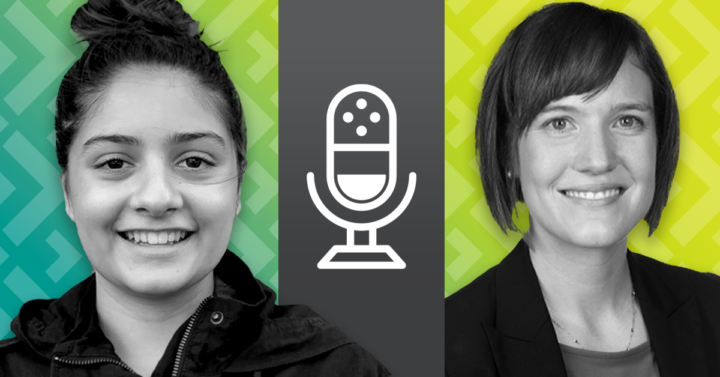
The mission of the Actuarial Foundation of Canada (AFC) is to promote mathematical education for younger Canadians. In this episode, we take a closer look at Girls to the Power of Math (G^M), a program that encourages the development of math skills in school-aged girls. We are joined by Founder Alexa Bailey, along with AFC member Jill Harper, FCIA.
NO TIME TO LISTEN? READ THE TRANSCRIPT.
Fievoli: Welcome to Seeing Beyond Risk, a podcast series from the Canadian Institute of Actuaries. I’m Chris Fievoli, Staff Actuary, Communications and Public Affairs at the CIA.
The mission of the Actuarial Foundation of Canada is to promote mathematical education for younger Canadians, and one of the programs they have worked with is Girls to the Power of Math.
To explain more about it, we are joined by the founder, Alexa Bailey, and by Jill Harper, who is Chair of the AFC Communications Committee.
Thanks to both of you for joining us today.
Harper: Thank you for having us, Chris.
Bailey: Good to be here.
Fievoli: Let’s start with you, Alexa. Could you give us a brief introduction of yourself and tell us where you are in terms of your current education?
Bailey: I’m heading into my first year of university at McGill to study biological engineering. This is a field that’s interesting to me.
It’s a unique program in Canada and one of the only places where you can study cell engineering at the undergraduate level.
I’m really interested in the course because I get to do lots of math and science – which are one of my greatest passions – but I’m not exactly sure if this is what I want to do after my degree. I’m just interested in the courses and what I get to study right now.
Fievoli: A while back, you identified a problem when it came to girls and mathematics. What inspired you to try to address this issue?
Bailey: We know that there is a gender gap in STEM-related fields. The 2016 Canadian census showed that less than one-quarter of people in the STEM workforce are women. Throughout elementary, I witnessed my teachers’ and classmates’ bias that boys are better than girls at math.
However, numerous studies have proven that there is no difference in math ability between genders. If someone like me who is resilient struggled against bias in the system, what will happen to other girls?
Despite my challenging experiences, I’ve kept my love of math and I’ve wanted to help other girls. I started tutoring my neighbour in math and found that through fun games, her confidence and grades improved. This led me to wonder if confidence in math differs between genders, and if it could be playing a role in the gender gap in STEM-related fields.
In 2018, I conducted a survey of over 300 elementary school students to assess math confidence. The results showed a statistically significant decline in girls’, but not boys’, confidence in math.
More specifically, I found that girls tend to lose confidence by Grade 6. This is consistent with previous research as well. This lack of confidence in math may contribute to fewer girls pursuing STEM-related fields in post-secondary.
I found the declining girls’ confidence in math to be concerning, and that’s how I had the idea for Girls to the Power of Math.
Fievoli: So, tell us about that program. What is Girls to the Power of Math all about?
Bailey: Girls to the Power of Math is a 10-week after-school program focused on boosting girls’ confidence. I wanted to create a fun environment where older girls mentor younger girls in math.
Our activities focus around counting and multiplication and include some games around financial literacy. We use games, songs, art, and physical activity to reinforce the ideas we are teaching.
For example, we have a 10-cent store where the kids budget their money and buy toys with their 10-cent coins using concepts of multiplication.
Many might know the game “What time is it, Mr. Wolf?” Well, we have a variation of this game where kids take steps in multiples to practise the times tables we are learning. We use art to emphasize the patterns of math, and we use song to help with memorization. Most of all, we have fun.
Fievoli: What makes this program different from other math tutoring programs?
Bailey: I think the previous question shows you that our focus is on having fun. We don’t want this program to feel like a math classroom. There is no ability requirement for Girls to the Power of Math.
If a student already knows their times tables, they will still benefit from the program as they will get reinforcement and we’ll have fun. If a student needs some help learning multiplication, they will build their skills in a fun social environment. This is very different from a tutoring program.
One more thing that is a key component of our program is mentorship. Research has shown that mentorship is an important aspect in keeping girls in STEM. We have high school girls be mentors and role models for the elementary school girls.
And it’s not just that high school girls are mentors. We have a tiered system of mentorship where participants become junior mentors, who then become mentors, who then become part of the operations team. We also use our social media platforms to promote women in STEM and showcase the variety of STEM-related possibilities.
Fievoli: That’s a good idea. Have you found that mentorship was a big aspect of your journey in math and science?
Bailey: Absolutely. Girls to the Power of Math would not be here, and I would not be where I am, without the mentorship I’ve received. Doctor Tony Schneider, who is a UBC professor, was my mentor during the study I conducted.
She helped me understand gender stereotypes and biases. The Society for Canadian Women in Science and Technology gave me a grant to start Girls to the Power of Math and have connected me with women in different STEM fields.
The Actuarial Foundation of Canada has been incredibly generous. Their support has allowed us to expand across British Columbia. I have an amazing group of people in my board of directors, one of whom is Ellen Whelan, who is an actuary. I’ve also benefited from male allyship.
Mentorship has helped me continue with math and science when I experience barriers and exposed me to different areas in STEM. I hope that Girls to the Power of Math can offer the same experience for girls.
Fievoli: And how can interested groups make use of this program?
Bailey: We invite everyone to follow us on Instagram, where we highlight events, interviews, and women who have made the difference in STEM. If you want to be a mentor, or if you want the program run in your elementary school, send us an email at info@girlstothepowerofmath.org.
Our hope is that this program will run across Canada, so we invite all interested parties to inquire.
Fievoli: Well, certainly quite the accomplishment. Thank you for sharing that information with us. Jill, maybe you can give us some background on how the AFC started their involvement with the Girls to the Power of Math program.
Harper: Sure. And I just want to say before I do that, Alexa, what an inspiration you are. You’re so incredible. And really it was Alexa who got the AFC involved with the Girls to the Power of Math program in the first place.
This all started in 2021 when Alexa reached out to the AFC to apply for funding after learning about the foundation from one of the foundation’s board members, Ellen, who Alexa mentioned earlier.
The AFC’s Youth Education Committee then took this application and reviewed it, and they were so impressed that they recommended $5,000 worth of funding for Girls to the Power of Math in 2021.
Of course, as you’ve heard, the program has been very successful. The committee continues to be quite impressed and has recommended a further increase to $10,000 of funding in 2022 to support the program’s plans for expansion.
Fievoli: So what other sorts of similar programs has the AFC been engaged with?
Harper: One of the AFC’s focus areas is on youth education, which is where the Girls to the Power of Math program sits.
Within this area, we support a variety of different programs focusing on financial literacy and math in candidates’ youth, although none of these programs specifically targeted girls in elementary schools the way Girls to the Power of Math does. Some target different age ranges, different aspects of diversity, or, you know, different stages in education.
If you’d like more information about the fantastic youth education work that the AFC supports, you can find this on our website at afc-fac.ca by selecting Youth Education under What We Do.
The AFC also supports a number of scholarships that you can also find under the What We Do drop-down menu on the website.
One scholarship that the AFC supports that I’d like to highlight here is the Girl Guides of Canada scholarships. This focuses on, of course, girls and math, but at a different stage in their education than Girls to the Power of Math.
Fievoli: To wrap up, can you tell us about some of the things that the AFC has coming up this fall, and if Members are interested, how can they get involved?
Harper: Fall is when we kick off our annual fundraising campaign, and during that campaign, we’ll be highlighting all the great work that the AFC supports. Interested members can look forward to updates on our scholarship programs and events that highlight the charities that the AFC supports.
The AFC is a volunteer organization, so we are always looking for new volunteers. There are sort of two main ways to get involved. You can express your interest by noting it in your CIA volunteer profile, and the CIA staff will make sure that you get connected with us.
If you’d rather be more direct, we also have a communications email address that you can use to get in touch with us. That email address is communications@afc-fac.ca.
Fievoli: OK, that’s great. Listen, thanks to both of you for taking time to speak with us today.
Harper: Thank you for having us.
Bailey: Thank you, Chris.
Fievoli: We now have over 100 episodes in our podcast series going back over the past three years, so we encourage everybody to subscribe, and you can do so through whatever platform you use to get your podcasts.
We would like to hear from you! So, if you have any suggestions or episode ideas, you can send them to podcasts@cia-ica.ca. And we’re always looking for content for our Seeing Beyond Risk blog. So, if you have some ideas you’d like to share, you can reach us at seeingbeyondrisk@cia-ica.ca.
Until next time. I’m Chris Fievoli and thank you for tuning in to Seeing Beyond Risk.
This transcript has been edited for clarity.





